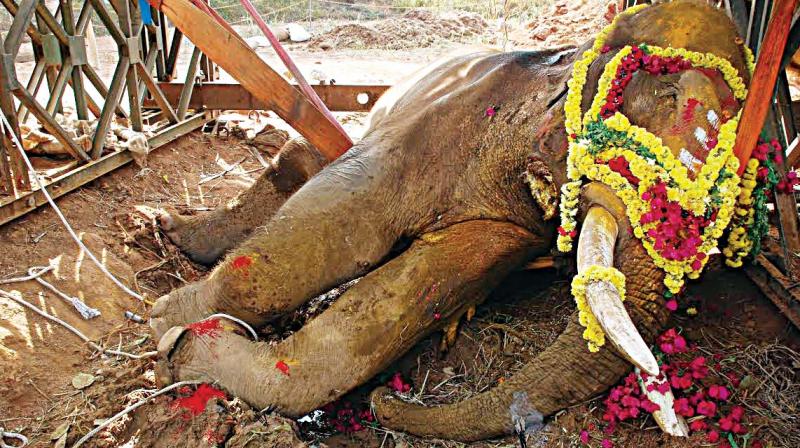Bengaluru: Injured tusker Sidda breathes his last

Bengaluru: The 35-plus-year-old wild tusker ‘Sidda’ breathed its last in early hours of Friday at a private farmland near Manchenabele reservoir off Magadi Road.
The elephant had fractured its right forelimb when it fell into a 10-foot-deep pit near Doddaladamara in Bengaluru South taluk in August this year. The injured pachyderm was lifted using cranes by the forest officials after it was shot with tranquilisers and veterinary doctors diagnosed it with a compound fracture and blindness in the right eye and partial blindness in the left eye. However, after the tranquiliser effect wore of, the wild animal managed to limp its way back into the forests, but on the way found the water body of Manchenabele apt for supporting its weight by staying inside the water.
The injured elephant that got into the Manchenabele Lake around Ganesh Chaturthi was nicknamed by the locals ‘Sidda’ who thought it was auspicious to have a wild elephant standing still at a water body for nearly a month. Veterinarians and wildlife volunteers monitored the animal by providing it with food laced with medicines and drinking water. Sidda was taking calcium supplements along with long acting antibiotics along with the food that were being kept for the animal. Whenever it felt hungry, the pachyderm walked out and had the food and got back into the water. The team of veterinarians and volunteers had camped on the banks of Machenabele Lake to observe its progress.
The team got to know that as the animal was standing most of the time in the water, the wound site where a broken bone was protruding started getting infected. The animal came out of the water during nights and wandered into the farmlands nearby. The animal could move only about 10 feet in an hour, native locals who observed the animal said.
In late October, Sidda fell to the ground lying there for days unable to get up as the infection had spread and he had developed septicemia. In early November, the army personnel who took note of Sidda’s condition decided to help him by setting up a temporary krall that enabled him to stand and support his weight with straps around him inside a secured shelter. He was again fed with food laced with medicines and forest officials and veterinarians said that his condition seemed to improve. The team of doctors which was continued the treatment while he was in the krall.
But Sidda breathed his last at around 2 am on Friday because of severe infection. A postmortem was done by a group of doctors from the Bannerghatta Biological Park in the presence of an NGO and wildlife volunteers. “Though the wound had appeared healed superficially, when they cut open the leg, there was a severe puss formation. The doctors were surprised that the animal could bear tremendous amount of pain caused by the infection. The doctors concluded that the cause of death was septicemia. They later buried the mammal at a vacant land nearby,” they said.

